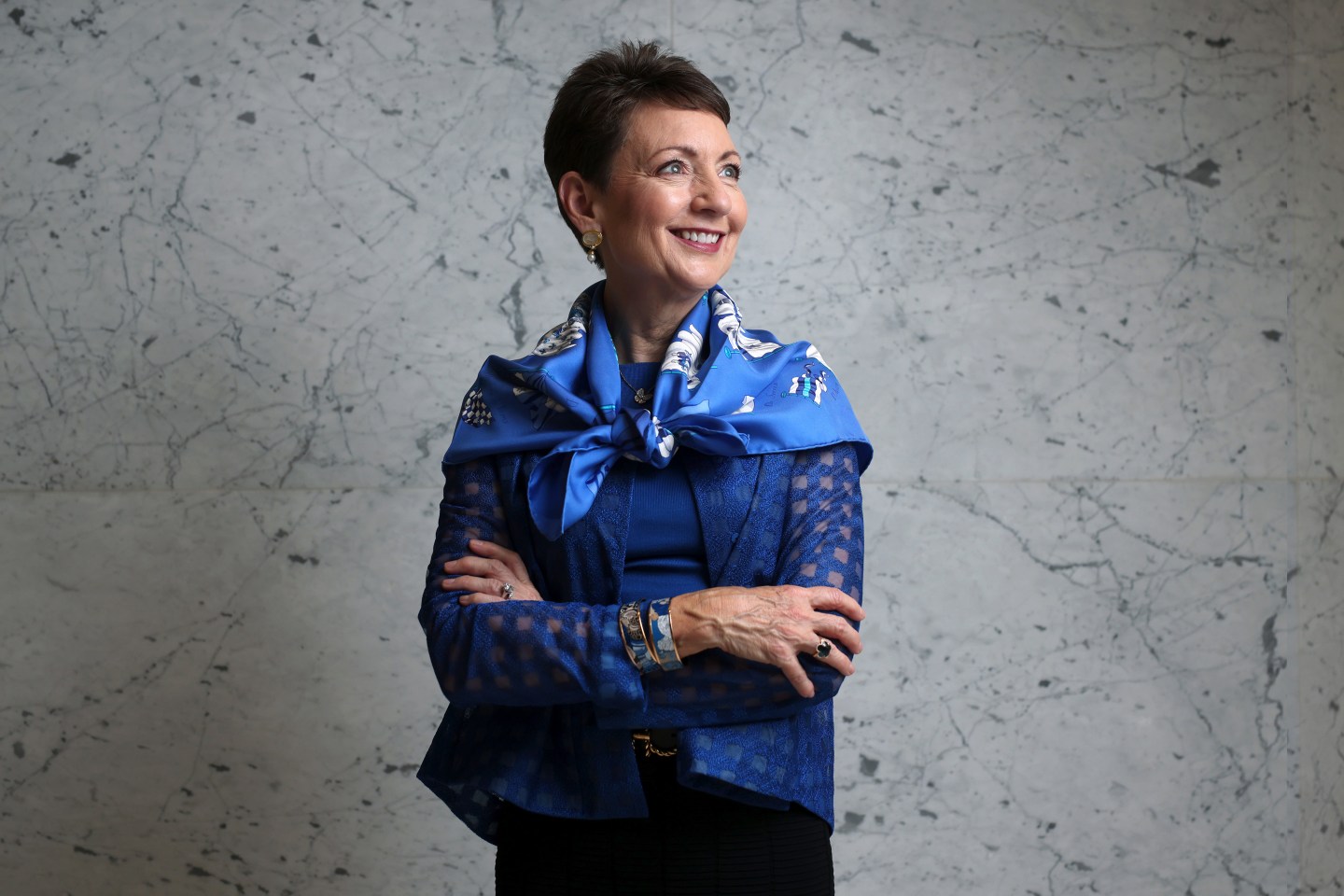Good morning, Broadsheet readers! Elon Musk chooses Twitter’s next CEO, the number of stay-at-home moms is rising, and a CFO job prepared Lynn Good for her decade atop Duke Energy. Happy belated Mother’s Day!
– Power on. Before Lynn Good became the CEO of Duke Energy in 2013, she was the company’s CFO. She says that finance background has served her well over the past decade as she’s prepared the utility business for a renewable future.
“What we’re trying to accomplish with the assets we build using our capital takes decades of investment,” she told Fortune‘s Phil Wahba. “So there’s a lot of strategy that sits in the CFO office. Where are we going? What are we spending money on? What are we trying to accomplish? It allows you to think through a lot of the issues that affect the business.”
Good has been a fixture on Fortune‘s Most Powerful Women list since she became Duke’s CEO. Last year she ranked No. 32 thanks to her efforts to fend off an activist-led push to break up the $28 billion company into three parts. Her decade-long tenure makes her one of the longest-serving female CEOs in the Fortune 500.

Duke Energy, based in Charlotte, N.C., serves 8.2 million customers in the U.S. Southeast and Midwest. Eight percent of its power comes from renewable sources (up from 1% in 2005) and Good expects that stat to reach 27% by 2030. She expects coal-based power to be obsolete within 12 years; it accounts for 17% of power today compared to 60% in 2005.
But those aren’t stats that are on most customers’ minds, even though they influence the American power grid and climate change. Phil asked Good if her CEO job is ever “a thankless task for a customer base that just takes service for granted.” “There’s an element of that,” Good acknowledged. “Most people see us as ‘I turn on the switch; does it work?’ They often don’t have any idea how we make it work.”
Satisfaction, then, comes not from customer appreciation but from acknowledgment from those who do pay close attention to the nation’s utilities. “I think about the important role we play and how we enable everything else,” Good said. “But I do want policymakers to understand what it takes to make it all work.”
Read Good’s full interview here.
Emma Hinchliffe
emma.hinchliffe@fortune.com
@_emmahinchliffe
The Broadsheet is Fortune’s newsletter for and about the world’s most powerful women. Today’s edition was curated by Kinsey Crowley. Subscribe here.
ALSO IN THE HEADLINES
- Tweet tweet. It's official: Linda Yaccarino is the new CEO of Twitter. Former colleagues of the NBC ad exec call her a "fearless leader in a male-dominated industry" and say she's well-suited to the challenge of wooing advertisers back to Twitter. Fortune
- Quick change. Chinese e-commerce company JD.com is bringing on its first female CEO to replace the current chief exec who had been in the role for only a year. Sandy Xu Ran is currently the CFO and joined the company in 2018 after nearly 20 years at PwC in China and the U.S. Reuters
- Take a seat. President Joe Biden will nominate World Bank executive director Adriana Kugler for a seat on the Federal Reserve Board. She will be the first Latina board member if confirmed. He also nominated current board member Lisa Cook for another 14-year term. New York Times
MOVERS AND SHAKERS: Nike has appointed Kimberly-Clark CFO Maria Henry to its board. Matea Gold will be the managing editor at The Washington Post.
IN CASE YOU MISSED IT
- 'Second puberty.' As the world reaches 1.1 billion postmenopausal women around the globe and prominent women open up about their experiences, understanding how menopause can interrupt women's careers as they approach senior positions is becoming more important. However, businesses are still slow to recognize the issue and provide benefits to support women going through it. Bloomberg
- Back at home. The share of stay-at-home moms nearly doubled from 2022 to 2023, returning to 25%, where it had typically hovered over the last five years with the exception of 2022. Last year, moms could still take advantage of pandemic-era flexibility. Sixty-four percent of stay-at-home moms—according to Motherly’s State of Motherhood report—would return to work if they had a flexible work schedule. Fifty-two percent said they would return if they had affordable childcare. Fortune
- Where we belong. The phrase "diversity and inclusion" is going out of style. Experts practicing in the field are adding "belonging" to the acronym: for DEI&B. "Belonging" is a different feeling than inclusion, experts say. New York Times
ON MY RADAR
Gone are 'daddy' days. These are 'mother' times New York Times
How real people are caught up in Reddit’s A.I. porn explosion Forbes
Was Cleopatra Black? We’re asking the wrong question Washington Post
Chimamanda Adichie: How I became Black in America The Atlantic
PARTING WORDS
"There are plenty of male athletes with kids that are significantly less accomplished, you might wanna worry about them instead."
—Naomi Osaka, responding to comments about her pregnancy and the future of her tennis career
This is the web version of The Broadsheet, a daily newsletter for and about the world’s most powerful women. Sign up to get it delivered free to your inbox.













